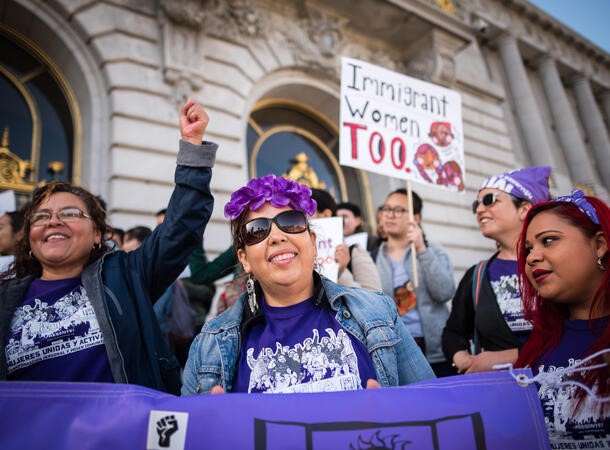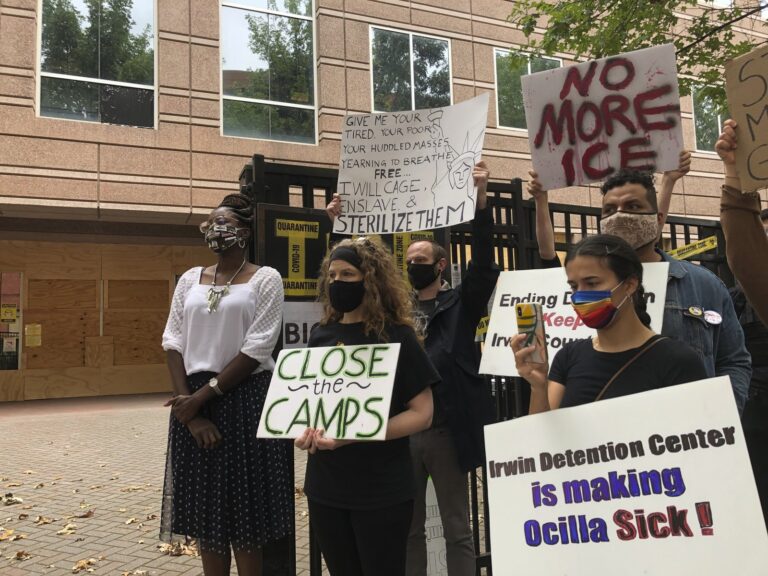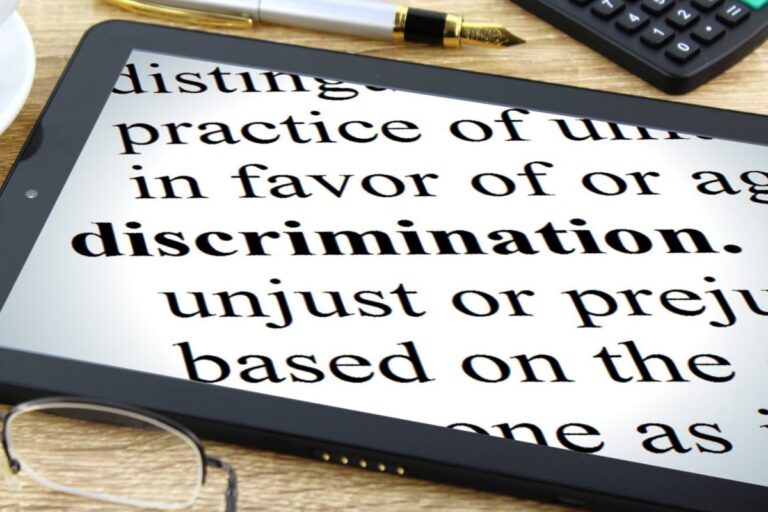All content categorized with: Immigration
Filter
Post List
Keeping Counsel: Challenging Immigration Detention Transfers as a Violation of the Right to Retained Counsel
In 2019 U.S. Immigration and Customs Enforcement (“ICE”) incarcerated nearly 500,000 individuals. More than half of the individuals detained by ICE were transferred between detention facilities, and roughly thirty percent of those transferred were moved between federal circuit court jurisdictions. Detention transfers are isolating, bewildering, and scary for the detained noncitizen and their family. They can devastate the noncitizen’s legal defense by destroying an existing attorney-client relationship or the noncitizen’s ability to obtain representation. Transfers also obstruct the noncitizen’s ability to gather evidence and may prejudicially change governing case law. This Note describes the legal framework for transfers and their legal and non-legal impacts. It contends that transfers violate noncitizens’ constitutional and statutory rights to retained counsel by obstructing the attorney-client relationship. Further, it argues that federal courts have jurisdiction to review right to counsel challenges to transfers under the Immigration and Nationality Act. Written with practitioners in mind, this Note canvasses the practical and legal difficulties of making such a challenge.
Legacy of Matter of A-B-: Reflecting on the Hardships Women and Other Individuals of Color Have Faced
By: Kathy Jara, Associate Editor, Vol. 27 (Celebrating Overturning Matter of A-B-, in Winning Back Protections for Refugee Survivors: Celebrating the End of Matter of A-B-, in Center for Gender and Refugee Studies (June 4, 2021),https://cgrs.uchastings.edu/news/winning-back-protections-refugee-survivors-celebrating-end-matter-b.) There are many arbitrary areas of immigration law that showcase deep-seated racist and…ON MOVEMENT LAWYERING: AN INTERVIEW WITH AZADEH SHAHSHAHANI
By Aashna RaoAssociate Editor, Vol. 26 In the past several years, a model of legal advocacy known as movement lawyering has gained increased attention. In reality, movement lawyering is nothing new—those who do this kind of work aim to provide legal support by following the lead of directly impacted communities…“We Are Asking Why You Treat Us This Way. Is It Because We Are Negroes?” A Reparations-Based Approach to Remedying the Trump Administration’s Cancellation of TPS Protections for Haitians
This Article places the Trump Administration’s decision to cancel TPS for Haitians within the longer history of U.S. racism and exclusion against Haiti and Haitians, observes the legal challenges against this decision and their limitations, and imagines a future that repairs the harms caused by past and current racist policies. First, this Article briefly outlines the history of exclusionary, race-based immigration laws in the United States, and specifically how this legal framework, coupled with existing anti-Black ideologies in the United States, directly impacted Haitians and Haitian immigrants arriving in the United States. Next, the Article provides an overview of the TPS decision-making process, the Trump Administration’s openly racist comments against Haitians and other people of color before and during the decision-making process to cancel TPS, and the departure from the established administrative process for TPS cancellation. The Article then reviews the legal challenges against TPS cancellation and the arguments that the decision violated the Equal Protection Clause and how such efforts reveal the limitations of litigation as a tool to achieve social justice. Looking towards the future, this Article discusses reparations and remittances as creative ways to repair some of the damage wrought by the United States’ history of racial discrimination in immigration and foreign policy against Haitians. Specifically, this Article explores three solutions: (1) recognizing the harms caused specifically to Haitians by the United States’ exclusionary foreign affairs and immigration policies; (2) using material and non-material forms of reparations, including extending TPS, offering a pathway for citizenship for TPS holders, or offering Haitian TPS recipients benefits to public programs; and (3) valuing the role remittances play in affirming Haitians’ autonomy and working towards eroding decades of imperialistic treatment of Haitians.Thirteenth Amendment Litigation in the Immigration Detention Context
This Article analyzes how the Thirteenth Amendment has been used to prevent forced labor practices in immigration detention. The Article assesses the effectiveness of Thirteenth Amendment litigation by dissecting cases where detainees have challenged the legality of labor requirements under the Trafficking Victims Protection Act. Given the expansion in immigration detention, the increasing privatization of detention, and the significant human rights implications of this issue, the arguments advanced in this Article are not only currently relevant but have the potential to shape ongoing dialogue on this subject.Toward a Race-Conscious Critique of Mental Health-Related Exclusionary Immigration Laws
This Article employs the emergent analytical framework of Dis/ability Critical Race Theory (DisCrit) to offer a race-conscious critique of a set of immigration laws that have been left out of the story of race-based immigrant exclusion in the United States—namely, the laws that exclude immigrants based on mental health-related grounds. By centering the influence of the white supremacist, racist,and ableist ideologies of the eugenics movement in shaping mental health-related exclusionary immigration laws, this Article locates the roots of these restrictive laws in the desire to protect the purity and homogeneity of the white Anglo- Saxon race against the threat of racially inferior, undesirable, and unassimilable immigrants. Moreover, by using a DisCrit framework to critique today’s mental health-related exclusionary law, INA § 212(a)(1)(A)(iii), this Article reveals how this law carries forward the white supremacist, racist, and ableist ideologies of eugenics into the present in order to shape ideas of citizenship and belonging. The ultimate goal of the Article is to broaden the conceptualization of race-based immigrant exclusion to encompass mental health-related immigrant exclusion, while demonstrating the utility of DisCrit as an exploratory analytical tool to examine the intersections of race and disability within immigration law.In Fear of Black Revolutionary Contagion and Insurrection: Foucault, Galtung, and the Genesis of Racialized Structural Violence in American Foreign Policy and Immigration Law
This article investigates the power relation between the political anatomy of the Black soul and non-somatic expressions of white supremacy-based violence. Utilizing Michel Foucault’s theories of discipline and punishment in conjunction with Johan Galtung’s theory of structural violence, I posit that the exercise of state-sanctioned discipline and punishment in furtherance of white supremacy constitutes racialized structural violence. Thus, this article contributes to the current public discourse concerning the role white supremacy plays in America by establishing a new construct that can be used to dissect the nature of racial oppression. Furthermore, this article analyzes the genesis and construction of racialized structural violence in American foreign policy and immigration law using America’s response to the Haitian Revolution as a case study. When combined, akin to discipline, American foreign policy and immigration law is a white supremacy-oriented, complex bundle of power technologies designed to evoke docility from Black and Brown nations. Both allow America to engage in dissociative white supremacy. Over time, America’s “right” and power to discipline and punish Black and Brown nations has been normalized as a rational function of our global society.Origin Stories: Critical Race Theory Encounters the War on Terror
Stories matter. They matter to those intent on maintaining structures of power and privilege, and to those being crushed by those structures. In the United States, the space to tell, and to hear, our stories has been expanding. This means that the histories and lived realities of those who have been excluded, particularly people of color, are seeping into mainstream discourse, into the books our children read, the movies and television shows they watch, and the many websites comprising social media. Critical race theory has played a role in this expansion. It insists that we recognize the legitimacy of the stories of those deemed “Other” because they have been erased or distorted beyond recognition in the dominant narrative. 3 Critical race theory has helped ensure that the legacies of genocide and broken treaties, of the cruelties imposed upon enslaved persons, of the forced inclusion and exclusion of those regarded simply as disposable labor, have worked their way into the realm of what can be talked about. Critical race scholars have exposed immigration injustices and called out xenophobia and Islamophobia. All this discomfits those who benefit, or believe they benefit, from the status quo.
Forced Sterilizations in ICE Detention Facilities and Possible Recourse for Undocumented Victims
By Alexandra van DorenAssociate Editor, Vol. 26 In September of 2020, many reacted with equal parts shock and disgust at the headlines that began to emerge detailing the unauthorized hysterectomies being performed in the Irwin County immigration detention facility in Georgia.[1] That shock, while understandable, is unfounded.
Are Caste and Race Really Analogous? Examining Caste-Based Discrimination in America
By Aashna RaoAssociate Editor, Vol. 26 As the U.S.’s South Asian immigrant population continues to grow, scholars across disciplines and cultures have attempted to reckon with the concept of caste-based discrimination in America.[i] Lawyers and authors alike have tried to draw parallels between caste and…


